| | | OFFLINE | | Post: 20.401
Post: 3.040 | Registrato il: 28/08/2005
Registrato il: 20/01/2009 | Administratore | Utente Master | |
|
 GENERAL AUDIENCE TODAY
GENERAL AUDIENCE TODAY
Catechesis #2 on
St. Thomas Aquinas
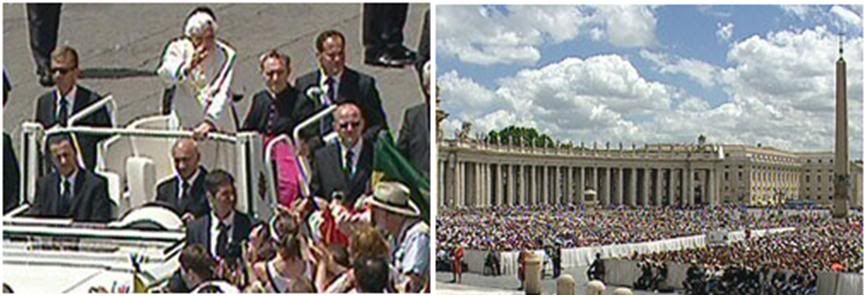
The Holy Father today gave a second catechesis on St. Thomas Aquinas, focusing this time on his teaching. Here is what he said in English:
Continuing our catechesis on the Christian culture of the Middle Ages, we turn to the teaching of Saint Thomas Aquinas, which the Church has consistently upheld as a model of sound theological method.
Thomas’s insistence on the harmony of faith and reason respected the autonomy and complementarity of these two ways of knowing the truth which has its ultimate origin in God’s Word.
Faith sheds fuller light on the truths which reason is naturally capable of knowing, while drawing from Revelation a supernatural knowledge of the divine mysteries and the Triune God himself.
Reason for its part serves to demonstrate faith’s credibility, to defend its teaching, and to show its inner consistency and intelligibility.
The complementary relationship between faith and reason reflects the truth that God’s grace builds on, elevates and perfects human nature, which is thus enabled to pursue the felicity which is its deepest desire.
Thomas’s conviction that we are naturally able to acknowledge the principles of the natural moral law remains timely, since that law, grounded in the truth of man’s nature, is the basis of respect for human dignity and universal human rights.
Saint Thomas is the patron of Catholic schools and universities; let us ask him to obtain for all of us the wisdom and understanding born of a deep and living Christian faith!
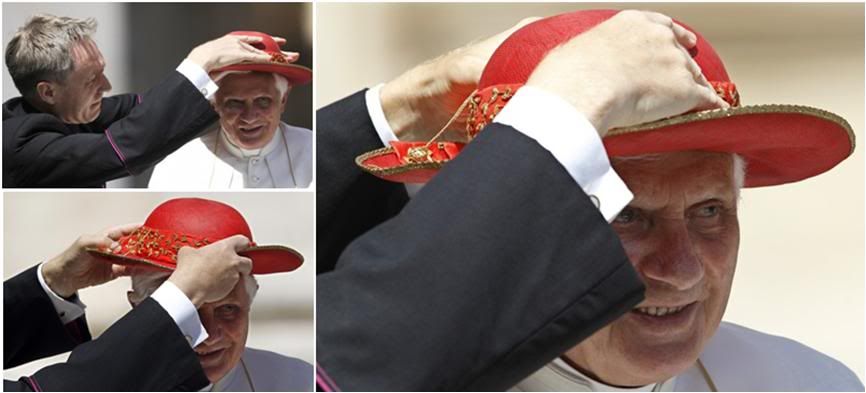
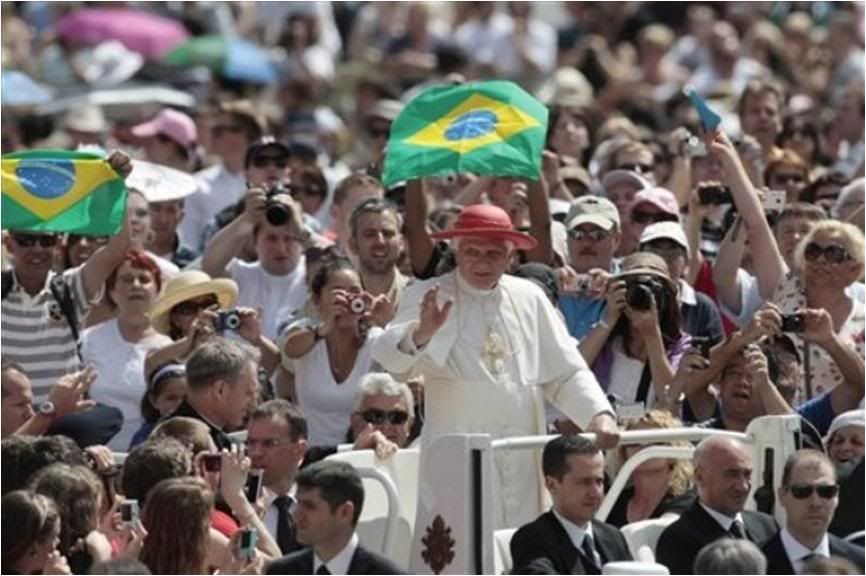
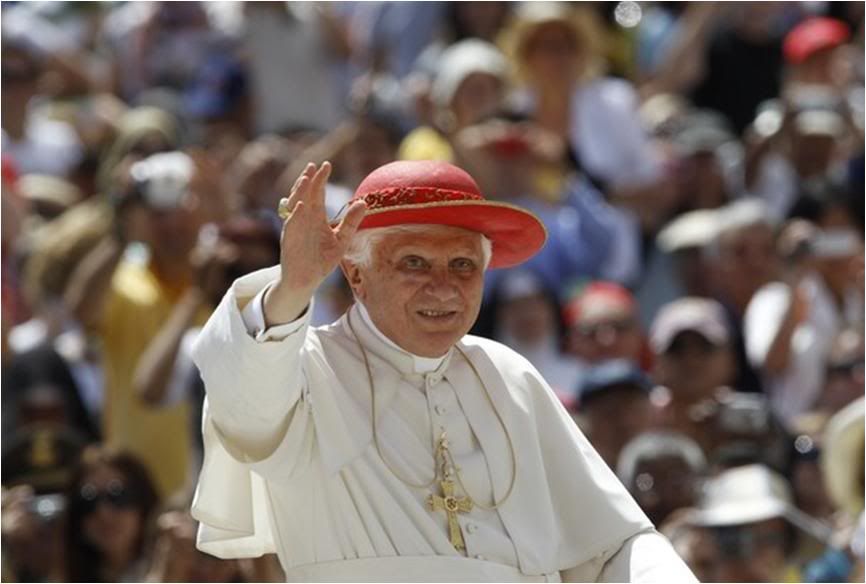
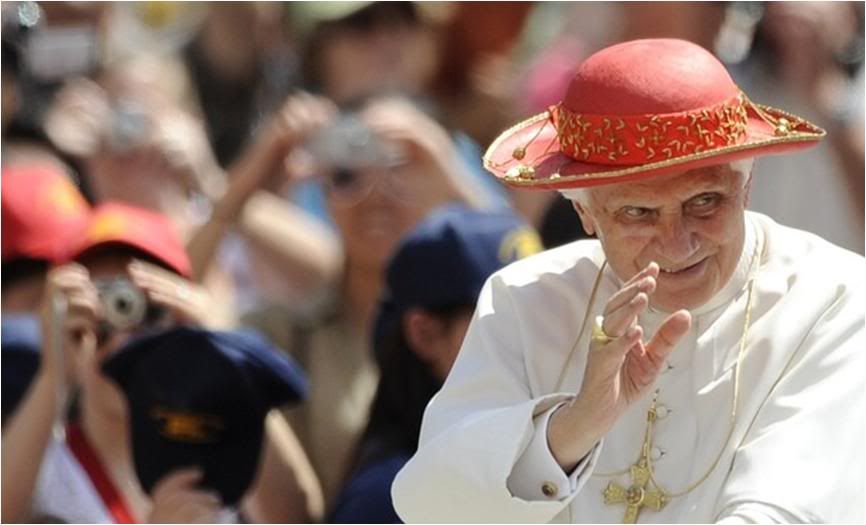
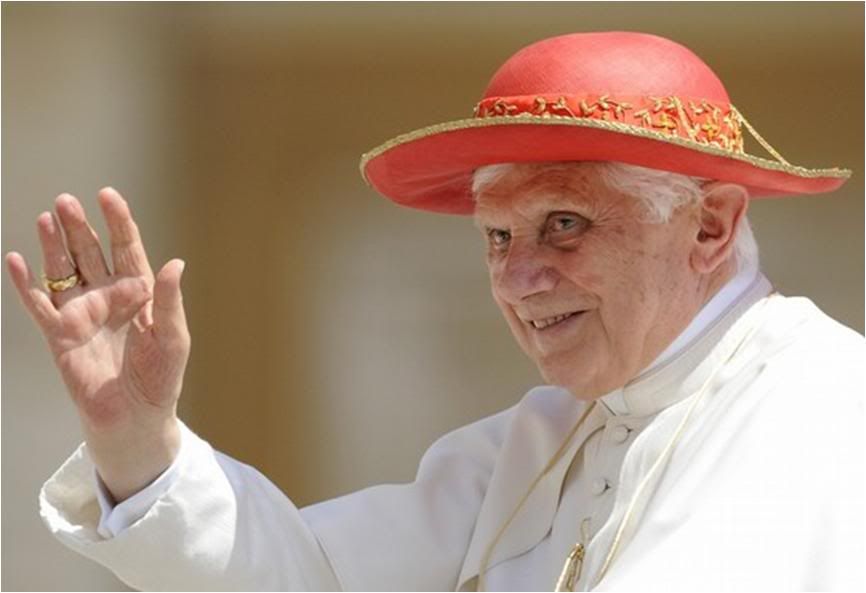
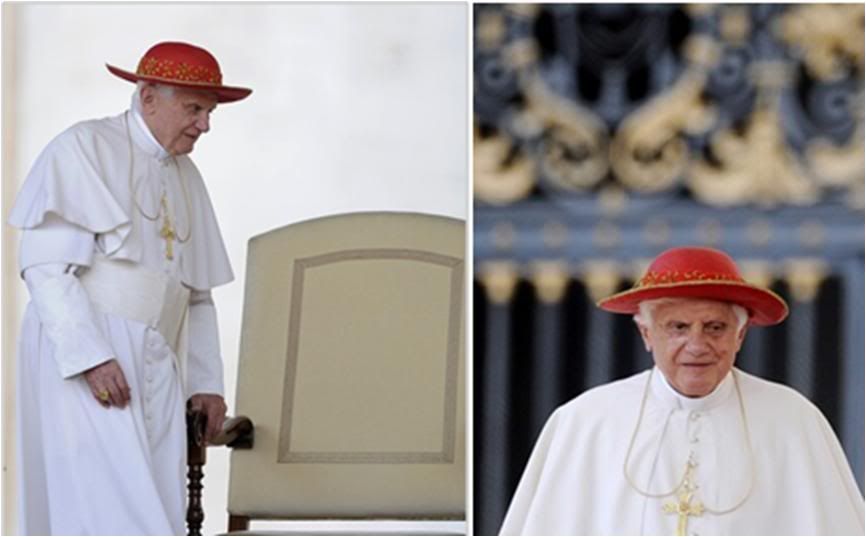
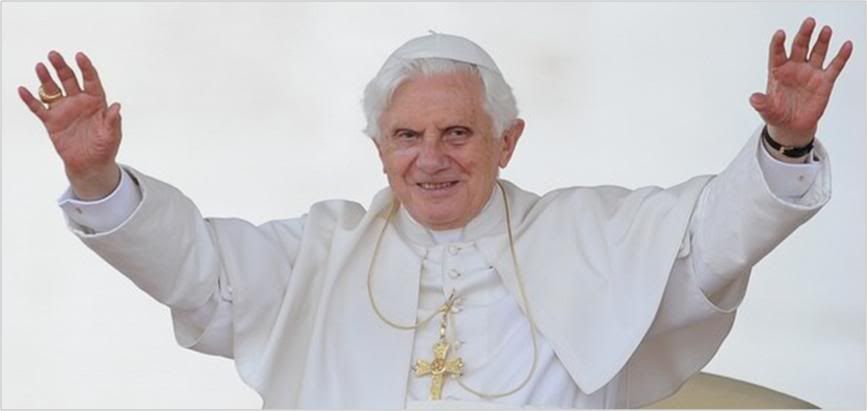
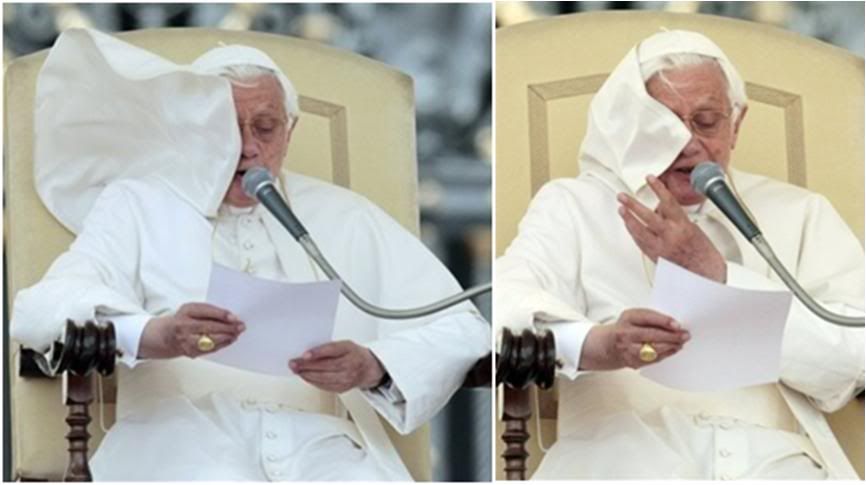
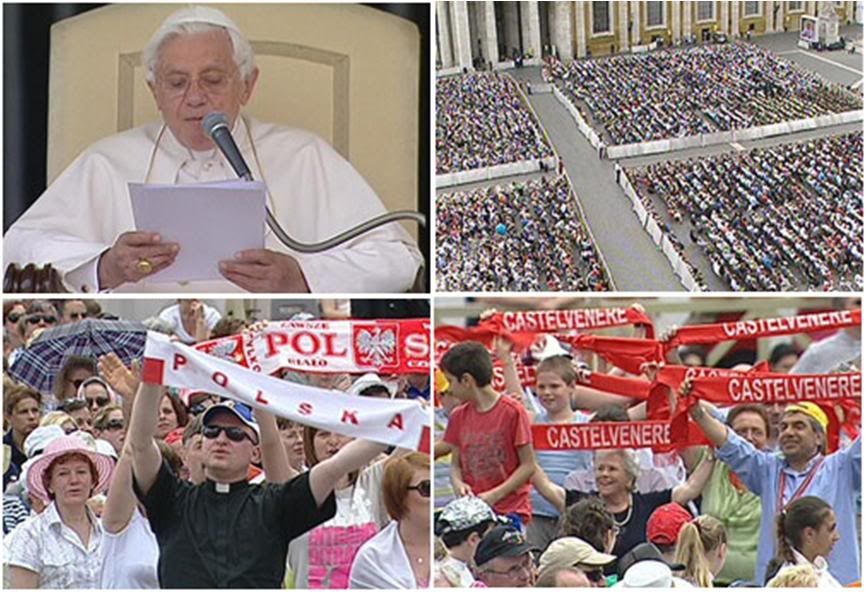 Here is a translation of the Holy Father's full catechesis:
Here is a translation of the Holy Father's full catechesis:
Dear brothers and sisters,
Today I would like to continue my presentation of St. Thomas Aquinas, s theologian of such importance that the study of his thought was explicitly recommended by the Second Vatican Council in two documents, the decree Optatam totius on the formation of priests, and the declaration Gravissimum educationis regarding Christian education.
Moreover, already in 1880, Pope Leo XII, who esteemed him greatly and was a great promoter of Thomistic studies, declared St. Thomas the patron of Catholic schools and universities.
The principle reason for this appreciation resides not only in the content of his teaching but also in the method he adapted - above all, his new synthesis and distinction of philosophy and theology.
The Fathers of the Church had found themselves confronting diverse philosophies of the Platonic type, in which a complete view of the world and of life was presented, including the question of God and of religion.
In confronting this philosophy, they themselves elaborated a complete view of reality, starting from faith and using elements of Platonism, in order to respond to the essential questions of men.
They called this view, based on Biblical revelation and elaborated with a Platonism corrected in the light of the faith, 'our philosophy'.
The word 'philosophy; was not, therefore, the expression of a purely rational system and, as such, distinct from the faith, but deriving form and thought from reason - a view which, certainly, went beyond their own capacity for reason, but was satisfying because of that.
For St. Thomas, the encounter with the pre-Christian philosophy of Aristotle (who died around 322 BC), opened a new perspective. Aristotelian philosophy was, obviously, a philosophy that had been elaborated without knowledge of the Old and New Testaments - it was an explanation of a world without revelation, by reason alone. This rationality was convincing.
So, for Thomas, the old form of 'our philosophy' as the Fathers called it, no longer worked. The relationship between philosophy and theology, between reason and faith, had to be rethought.
There was a 'philosophy' that was complete and convincing in itself, a rationality preceding faith; and then there was 'theology', which is thinking with the faith and in the faith.
The pressing question was this: Were the world of rationality, of philosophy that had been conceived without Christ, and the world of faith compatible? Or are they mutually exclusive?
There was no lack of thoses who affirmed the incompatibility of these worlds, but St. Thomas was firmly convinced that they were compatible - even that the philosophy that had been elaborated without Christ almost awaited the light of Christ in order to be complete.
This was the great 'surprise' of St. Thomas which determined his way as a thinker. To show the independence of philosophy and theology and, at the same time, their reciprocal relationship, was the historical mission of this great teacher.
Thus, it is understandable that in the 19th century, when the incompatibility of faith and reason was strongly proclaimed, Pope Leo XII designated St. Thomas as the guide for the dialog between one and the other.
In his theological work, St. Thomas assumed and concretized this relationship. Faith consolidates, integrates and illuminates the patrimony of truth that human reason can acquire. The trust that St. Thomas placed in these two instruments of knowledge - faith and reason - can be traced to his conviction that both come from the one spring or source of every truth, the divine Logos, which operates in the area of creation as it does in that of redemption.
Along with the accord between reason and faith, one must also recognize, on the other hand, that they employ cognitive processes that are different.
Reason accepts a truth by the force of its intrinsic evidence, mediated or not. Faith accepts a truth based on the authority of the Word of God that has been revealed.
St. Thomas writes at the start of his Summa Theologiae: "The order of science is double. Some proceed from principles known through the natural light of reason, like mathematics, geometry and similar sciences. Others proceed from principles known through a higher science, just as [architectural] perspective proceeds from principles known through geometry, and music from principles known through mathematics.
In this way, sacred doctrine -that is, theology - is a science because it proceeds from principles known through the light of a higher science, namely, the science of God and the saints" (I, q. 1, a. 2).
This distinction assures the autonomy of the human sciences as well as the theological sciences. But this is not equivalent to separation - rather, it implies a reciprocal and advantageous collaboration.
Faith, in fact, protects reason from every temptation to mistrust its own capacity. It stimulates it to open itself to ever wider horizons; it keeps alive the search for the fundamental, and when reason applies itself to the supernatural sphere of the relationship between God and man, it enriches its own work.
According to St. Thomas, for example, human reason can undoubtedly arrive at affirming the existence of one God, but only faith, which accepts divine revelation, is capable of drawing (good) from the mystery of the love of the One and Triune God.
On the other hand, it is not just faith that helps reason. Reason too, with its means, can do something important for faith, by rendering the triple service that St. Thomas summarizes in the Proemium of his commentary on Boetius's De Trinitate: "To demonstrate the foundations of the faith; to explain through metaphors the truths of the faith; and oppose the objections raised against faith" (q. 2, a. 2).
The entire history of theology is, basically, the exercise of this commitment of intelligence which shows the intelligibility of faith, its articulation and internal harmony, its reasonableness, and its capacity to promote the good of man.
The correctness of theological reasonings and their real cognitive significance are based on the value of theological language which, according to St. Thomas, is principally an analogical language.
The distance between God, the Creator, and his creatures, is infinite, the dissimilarities always much more than the similarities (cfr. DS 806). Despite this, in all the difference between Creator and creature, there is an analogy between being created and the being of the Creator who allows us to speak with human words about God.
St. Thomas founded the doctrine of analogy, more than just on exquisitely philosophical arguments, but also on the fact that with Revelation, God speaks to us and has thus authorized us to speak of him.
I think it is important to reclaim this doctrine. In fact, it helps us to overcome some of the objections of contemporary atheism which denies that religious language has an objective significance, and sustains instead that it only has a subjective or simply emotive value.
This objection results from the fact that positivistic thinking is convinced that man does not know 'being' itself, only the experimentable functions of reality.
With St. Thomas and with the great philosophical tradition, we are convinced that, in reality, man knows not only the functions - object of natural sciences - but also knows something about 'being' itself: For example, he knows the person, the You of the other, and not only the physical and biological aspect of his being.
In the light of this teaching of St. Thomas, theology affirms that, for all its limitations, religious language is endowed with sense - because we touch being - like an arrow that is aimed at the reality which it signifies.
This fundamental accord between human reason and Christian faith is also seen in another basic principle of Aquinas thought: divine grace does not nullify, but it supposes and perfects, human nature. The latter, in fact, even after sin, is not completely corrupted but wounded and weakened.
The Grace lavished by God and communicated through the Mystery of the Word incarnate is an absolutely gratuitous gift with which nature is healed, potentiated and helped to follow the innate desire in the heart of every man and every woman: happiness. All the faculties of the human being are purified, transformed and elevated by divine Grace.
An important application of this relationship between nature and Grace is seen in the moral theology of St. Thomas Aquinas, which is of great relevance now. At the center of his teaching in this field, he places the new law, which is that of the Holy Spirit.
With a profoundly evangelical view, he insists on the fact that this law is the Grace of the Holy Spirit given to all who believe in Christ. To this Grace is joined the written and oral teaching of doctrinal and moral truths transmitted by the Church.
St. Thomas, underscoring the fundamental role in moral life of the action of the Holy Spirit, of Grace from which flow the theological and moral virtues flow, makes us understand that every Christian can reach the high perspectives of the Sermon on the Mount if he lives an authentic relationship of faith in Christ, if he is open to the action of the Holy Spirit.
But, Aquinas adds, "even if Grace is more effective than nature, nonetheless nature is more essential for man" (Summa Theologiae, ia, q. 29, a. 3), for whom, in the Christian moral perspective, there is a place for reason, which is able to discern the natural moral law.
Reason can recognize it, considering that which is good to do from that which must be avoided, in order to achieve that happiness which everyone wants at heart and that also imposes a responsibility towards others, and therefore, a quest for the common good.
In other words. man's virtues, theological and moral, are rooted in human nature. Divine Grace accompanies, sustains and urges ethical commitment but, by itself, according to St. Thomas, all men - believers or not - are called to recognize the demands of human nature expressed in natural law, and to be inspired by it in formulating positive laws, namely, those issued by civilian and political authorities to regulate human coexistence.
When natural law and the responsibility it implies are denied, then life opens itself tragically to ethical relativism on the individual level, and to the totalitarianism of the State on the political plane.
The defense of the universal rights of man and the affirmation of the absolute value of personal dignity postulate a foundation. Is it not precisely natural law itself that is this foundation, with the non-negotiable values that it indicates?
In his encyclical Evangelium vitae, Venerable John Paul II wrote words that remain of great relevance: "It is urgent, therefore, for the future of society and the development of a healthy democracy, to rediscover the existence of human and moral values that are essential and innate, which come from the truth itself of the human being, and express and protect the dignity of the person: values which, therefore, no individual, no majority and no state could ever create, modify or destroy, but must only be acknowledged, respected and promoted" (No. 71).
In conclusion, Thomas offers us a concept of human reason that is broad and trustful: broad because it is not limited to the spaces of the so-called empirico-scientific reason, but open to all of being, and therefore, even to the fundamental and irrenunciable questions of human life; and trustful because human reason, especially when it accepts the inspirations of Christian faith, promotes a civilization that recognizes the dignity of the person, the untouchability of his rights and the cogency of his duties.
It is not surprising that the doctrine on personal dignity, which is fundamental for the recognition of the inviolability of human rights, matured in the circles of thought that took in the legacy of St. Thomas Aquinas, who had a very elevated concept of human nature.
He defined it, with his rigorously philosophical language, as "that which is most perfectly found in all of nature, namely, a subject that subsists in a rational nature" (Summa Theologiae, Ia, q. 29, a. 3).
The profundity of St. Thomas Aquinas's thinking comes forth - let us never forget this - from his sincere faith and his fervent piety, which he expressed in inspired prayers, as this one in which he asks God, "Grant, I pray to you, the will to seek you, the wisdom to find you, a life to please you, a perseverance that awaits you with trust, and a trust which in the end will lead to possessing you".
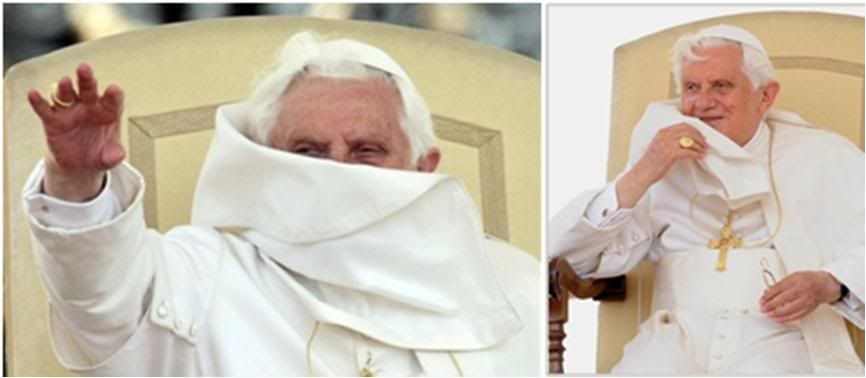
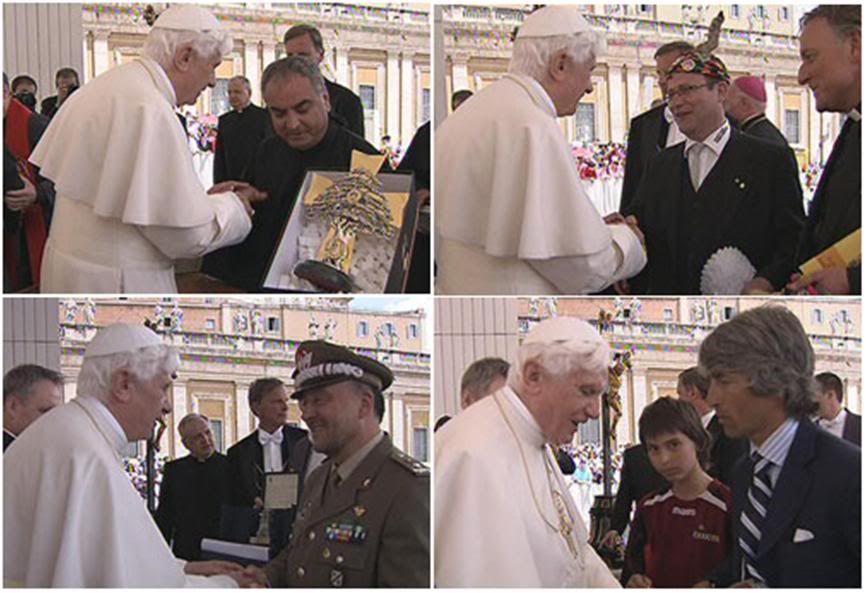
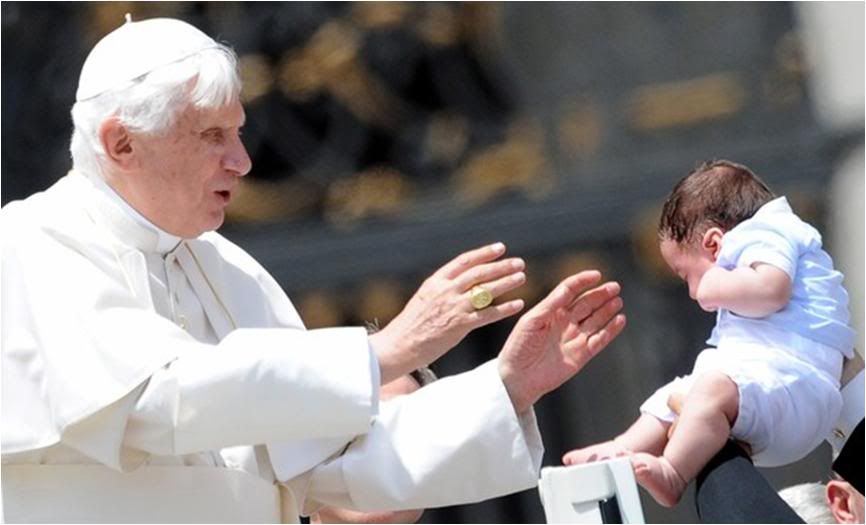
[Modificato da TERESA BENEDETTA 17/06/2010 11:04] |